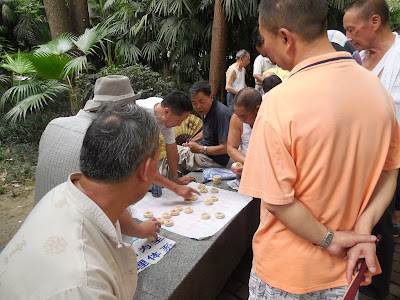Go
This is described as the grandfather of all board games. It originated 2500-3000 years ago in China. The game involves two players, and I've only seen men playing, never women. That is to say, only two players are moving the pieces, but there are many others surrounding them giving advice.
The two players alternately place black and white playing pieces called 'stones' on the vacant intersections of a grid. The object is to use one's stones to surround a larger total area of the board than the opponent. Once placed on the board, the stones cannot be moved, but they are removed if captured. This is done by surrounding an opposing stone or group of stones by occupying all the adjacent (but not diagonal) points. It is is rich in strategy, although the Internet calls these 'simple' rules. The game has no set ending limits but can last from 20-90 minutes. It is over when neither play chooses to make another move and the winner is determined by counting the controlled points and the captured stones.
Chinese Chess
Xiangqi is one of the most popular board games in China and the one I've seen most frequently. It is also played with two players, and their host of not-so-silent onlookers. There is always a lot of advice and commentary going on around this board game.
It started about 1200 years ago and is another game of strategy. The game represents a battle between two armies where the objective is to capture the general (king). It is also similar to western chess in that the various tokens are limited to specific move directions and jumps, although the pieces are all round discs with different symbols painted on them. It can last several minutes or drag on for hours.
Card Games
I have no idea what game the card players are doing, or if the people I see playing cards are always doing the same game, but face cards are very popular, both with men and women. They are always played with four players, and don't always attract the spectators of the two games above. The games also seems to move more quickly as they slap down their cards as hands are flying to the piles.
Mahjongg
Mahjongg is a game of skill, strategy, calculation, and a degree of chance. It is sometimes classified as a domino game, but plays more similar to Rummy. It is an ancient game that originated in China, although it is uncertain when. Four players attempt to build sets by drawing and discarding 144 tiles based on Chinese characters and symbols. Not long ago in Mexico I spent an afternoon with a friend who was trying to teach two of us how to play. It is very complicated.
I have not seen Mahjongg played in parks or on the street here, as the other games. Instead the players sit at a table in cafes or small centres dedicated to Mahjongg where several tables are set up.
Mahjongg was originally a gambling game. For that reason it was banned in China when the Communist government took over in 1949 because it was regarded as a symbol of capitalist corruption. After the Chinese Revolution the game was revived without the gambling elements. I've never witnessed money involved in the play. The prohibition was officially revoked in 1985.
Today it is a favourite pastime in China, as well as a popular activity in the US and around the world. The first Mahjongg sets were sold in the US by Abercrombie and Fitch in 1920.
Chinese Checkers
Many of us grew up playing Chinese Checkers, but I just want to set the record straight. I have not seen it played here so I did a little research. It is not a variation of the Checkers game, nor did it originate in China! Would you believe Chinese Checkers originated in Germany in 1892 under the name Stern-Halma, reflecting the older American game of Halma (never heard of it). The 'Stern' was added to reflect the German word for 'star' since the game board was changed to the star shape we associate with the game now.
The name Chinese Checkers originated in the USA as a marketing scheme in 1928 by Bill and Jack Pressman. Originally the Pressman Company called it Hop Ching Checkers, later changed to Chinese Checkers. So that explains why I've not seen it here, and probably never will.
New Games
While older Chinese people still actively play the games of previous centuries, many Chinese people are now moving to games of this century. Just this month (July 2013) the Chinese government has lifted the 13 year ban on game consoles. China enacted the ban over concerns about potential harm to the physical and mental development of children. (Not an unfounded concern).
But there are controls on the devices. Foreign companies such as Nintendo, Sony and Microsoft need approval from 'culture-related authorities' to promote and sell their products in China. The consoles may also only be sold if they are made in Shanghai's new free trade zone. Does that sound Communistic free enterprise, or free-enterprise under Communism? Either way, I'm sure the big gaming companies are happy, as well as lots of Chines players. I just hope it doesn't destroy the atmosphere of the lively entertainment in the local parks.
.JPG)





.JPG)
.JPG)


No comments:
Post a Comment